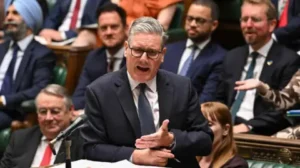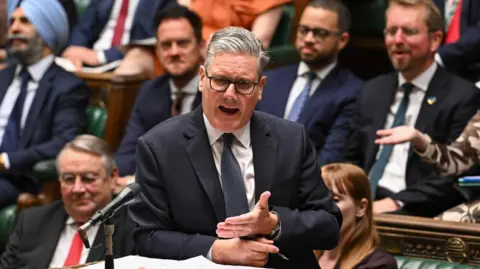In a significant political maneuver, Prime Minister Sir Keir Starmer has once again decided to assert his authority over the Labour Party by suspending several of its Members of Parliament (MPs) for dissenting against the government’s welfare policies. This move echoes previous actions taken last summer when Starmer removed the party whip from a group of Labour MPs who rebelled over the two-child benefit cap. As a new parliamentary session approaches amidst preparations for the summer break, Starmer has opted to make a bold statement, reinforcing party discipline at a time when the Labour Party seems poised to face significant challenges ahead.
The recent suspensions involve four Labour MPs who have now been left to sit as independents in the House of Commons. Furthermore, three additional MPs have been stripped of their roles as trade envoys, positions which, while unpaid, traditionally carry a degree of prestige and responsibility. This stern disciplinary action appears to be rooted in an effort to deter future rebellions and instill a greater sense of loyalty among MPs elected under the Labour banner. The Chief Whip, Sir Alan Campbell, personally informed the affected MPs post-Prime Minister’s Questions, indicating a direct and deliberate approach from the leadership.
The rationale behind the suspensions seems to be twofold. Firstly, they serve as a deterrent by stamping out any inclination towards dissent while signaling the importance of party unity. Secondly, senior officials have described their actions as a necessary response to repeated orchestrated rebellion against the government. Starmer’s administration aims to underline that dissent will not be tolerated, especially in the lead-up to contingencies like potential reforms to special educational needs provisions that may incite further disagreements.
However, reactions from within the Labour Party are mixed. While some MPs express understanding regarding the need for cohesion within the ranks, others deem the suspensions as “petty,” “vindictive,” and indicative of weakness. One senior Labour figure described the situation as akin to “public executions,” a striking metaphor highlighting the perception among some MPs that such actions are not only extreme but set a damaging precedent for party cohesion. Even some of those who remain loyal to Starmer question the effectiveness of these measures, suggesting that they could further alienate constituents and undermine morale among party members.
Critics of the suspensions have raised concerns over the impact on party unity, especially as the Labour Party seeks to navigate a political landscape fraught with obstacles. The recent disciplinary actions come at a sensitive time, with many MPs feeling that these decisions reflect poorly on a government still relatively new and in need of solidarity among its ranks. There’s an element of irony in the suspensions, as the MPs losing their envoy roles are notably from minority ethnic backgrounds, raising questions about the inclusivity and fairness of Starmer’s approach, especially when contrasting their situations with those of Liberal Democrat trade envoys who have maintained their positions despite differing loyalties.
To counteract dissatisfaction, Starmer has been making a concerted effort to engage more with his MPs, attempting to rehabilitate his image following criticisms regarding detachment. He has been spending increased amounts of time with colleagues, partaking in parliamentary discussions, and sharing meals, seemingly to forge stronger relationships. However, the underlying intention behind the recent suspensions casts a shadow over these efforts, leaving some to wonder if this disciplinary strategy was the most effective formula for fostering a supportive and united party environment.
In light of all this, Sir Keir Starmer is navigating a precarious path. His authority is being firmly established through stringent disciplinary measures, but there are inherent risks involved. The ramifications of his actions could either stabilize the Labour Party moving forward or breed resentment that might challenge its cohesiveness in the critical periods ahead. As Labour gears up for future political battles, the coming days will reveal whether Starmer’s strategy will foster a sense of unity or deepen divisions within the party.











